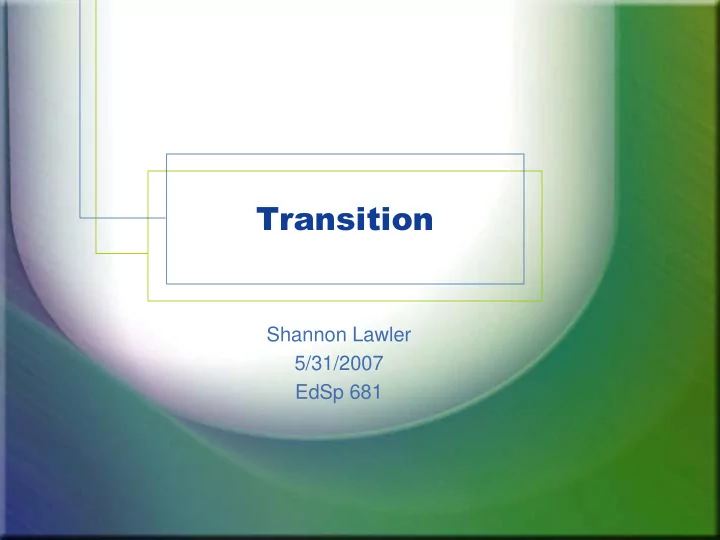

Transition Shannon Lawler 5/31/2007 EdSp 681
What is it? • A coordinated set of activities designed within an outcome- oriented process that promotes movement from school to post- school activities including: post-secondary ed, vocational training, supported employment, adult services or independent living
Transition-definition broadened • “Recently the concept of transition planning for students with disabilities has been broadened to include other points in a student’s educational career. For example, transition planning is being done for students transitioning from elementary to middle school and from middle school to high school.” Council for Exceptional Children Website http://www.cec.sped.org/AM/Template.cfm?Section=Transition&Template=/TaggedPage/Tag gedPageDisplay.cfm&TPLID=36&ContentID=5619
What the law states: Beginning at age 14, or younger, a statement of transition service needs of the student. Section 300.347 (b)(1) Transition includes 5 areas: 1. Employment 2. Post secondary education 3. Home living 4. Community participation 5. Recreation & leisure
Examples of community Examples of home participation living skills • • Knows basic legal Maintains personal rights and where to grooming obtain legal • Selects appropriate assistance housing • Makes legal • Demonstrates decisions personal money • Makes informed management choices • Uses public • Recognizes danger transportation or can drive • Understands street • safety Demonstrates written and oral • Knows how to communication access help • Recognizes home • Can self-medicate safety issues properly • Performs everyday • Locates community household tasks services
Examples of education Examples of employment • Knows how to • Knows requirements apply for admission of chosen to post secondary profession • Makes satisfactory • Makes informed progress toward choices about jobs diploma based on interests, • Has skills needed preferences, abilities to succeed in post • Cab access secondary assistance in finding programs a job • Knows self • Demonstrates advocacy general job skills strategies and uses and work attitudes them for keeping a job • Understands disability and can request appropriate accommodations
Recreation & Leisure • Participated in individual leisure activities • Participates in group leisure activities • Knows how to access various types of entertainment • Recognizes hobbies/interests • Health club/ YMCA/YWCA
Putting it all together • Student is assessed as part of 3 year re-evaluation in order to comply with IDEA • From the test results, a statement of needs are laid out • IEP goals are written to address needs identified • When all identified educational needs are met, student will graduate
Questions/ Concerns Contact info: Shannon Lawler New Prague Transition Program slawler@np.k12.mn.us
Recommend
More recommend